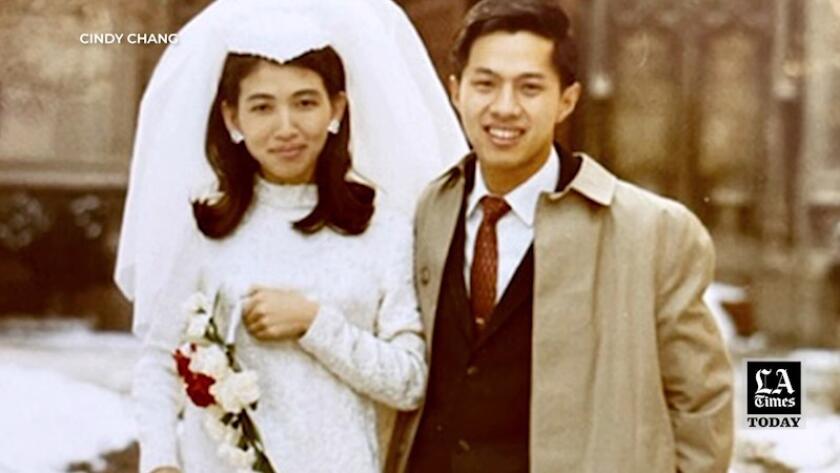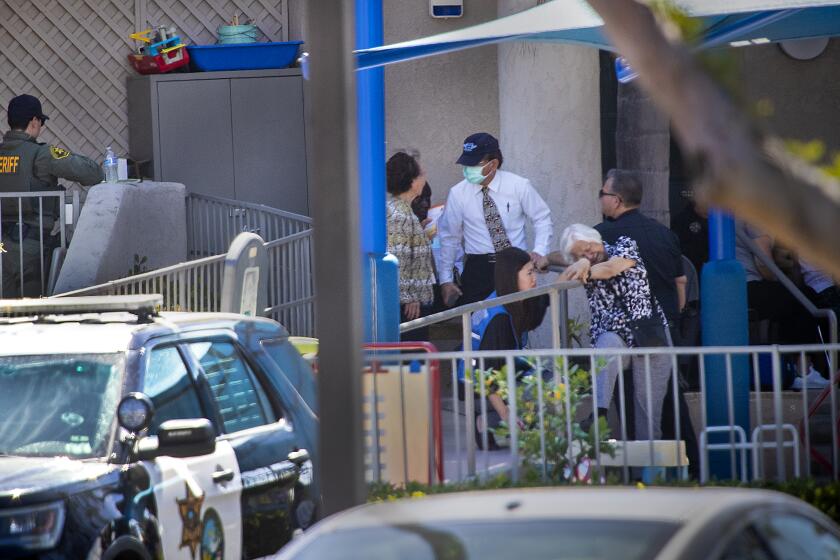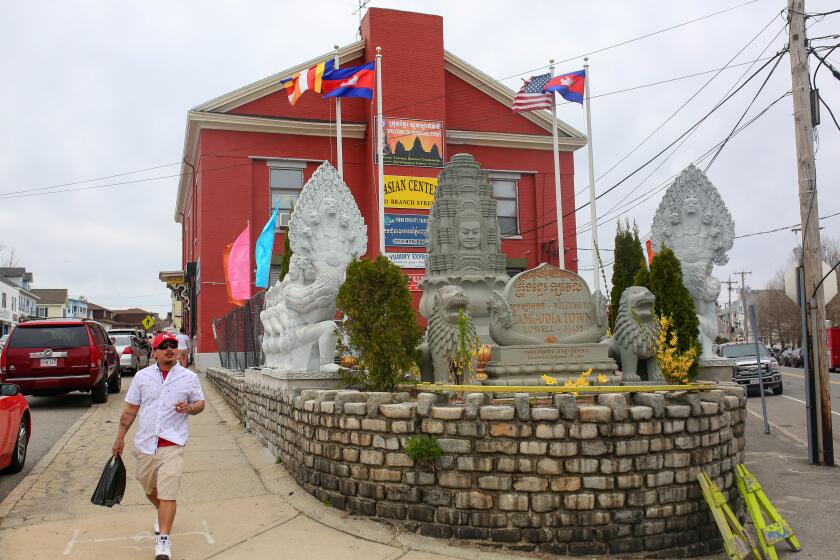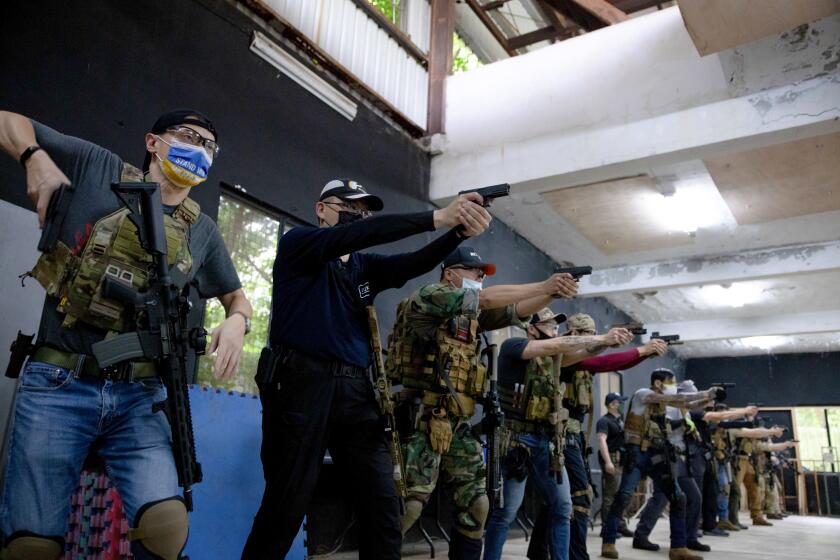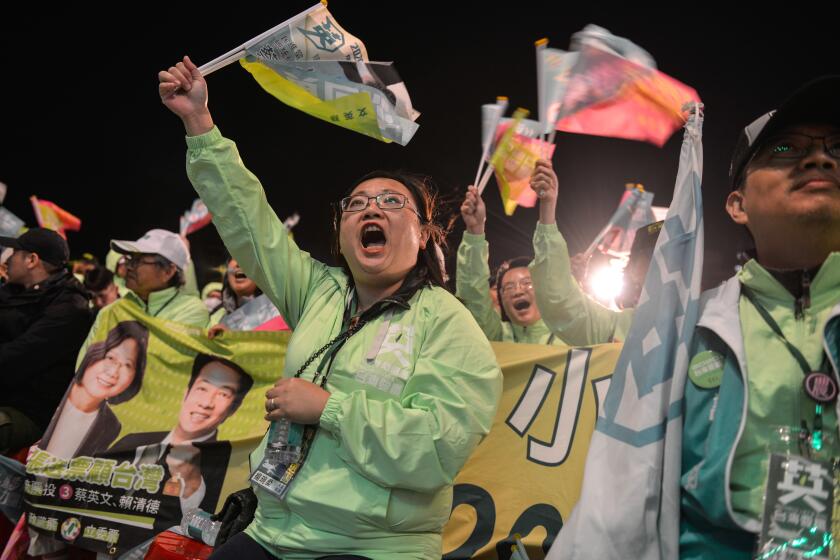Taiwan’s political divide fueled a gunman’s rage. It also splits my family
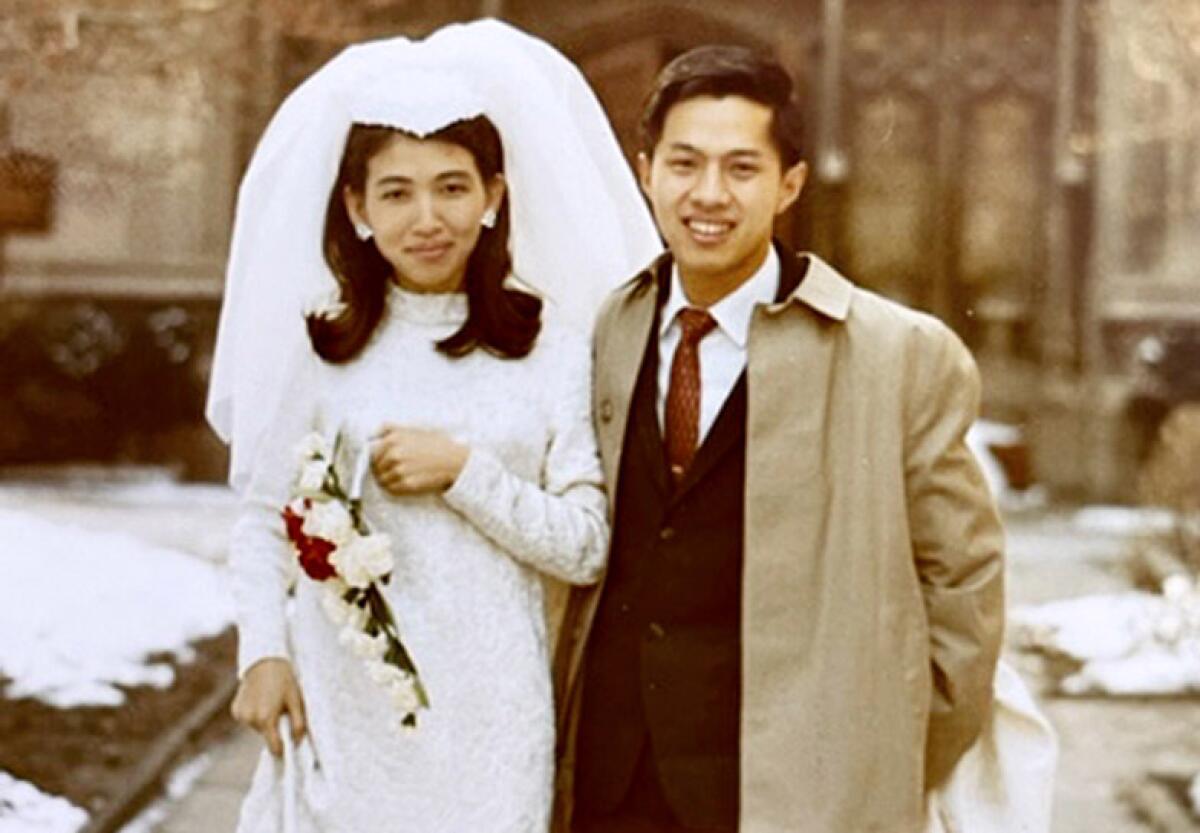
- Share via
After my parents got married, my Yeye went to my Ah-Gong’s house in Taiwan to introduce himself.
Ah-Gong — my mom’s father — refused to come to the door.
Yeye — my dad’s father — was a waishengren, or someone who had arrived from mainland China in the 1940s.
As far as Ah-Gong was concerned, waishengren were oppressors who had taken over his country, hogged the best jobs, massacred civilians and jailed anyone who spoke against the government.
Even if he had come out, Ah-Gong couldn’t have articulated his unhappiness to Yeye.
Ah-Gong was fluent in Japanese, in addition to Taiwanese, since he had grown up under Japanese colonial rule. He spoke little Mandarin. The gulf between my grandfathers couldn’t be bridged with words, even though Yeye had brought a friend to interpret.
- Share via
Watch L.A. Times Today at 7 p.m. on Spectrum News 1 on Channel 1 or live stream on the Spectrum News App. Palos Verdes Peninsula and Orange County viewers can watch on Cox Systems on channel 99.
Since that day in 1970 when my grandfathers went their separate ways without speaking, Taiwan has evolved from the “White Terror” of martial law into a full-fledged democracy.
But China has grown increasingly aggressive about its threats to take over Taiwan, which it considers part of its territory.
In this climate, people in Taiwan — including descendants of waishengren — have become more determined to defend their island’s de facto independence. It is common nowadays to have waisheng heritage yet consider yourself Taiwanese.
This month, this complicated history came to the world’s attention when a gunman opened fire at a Taiwanese Presbyterian church in Laguna Woods, killing one and injuring five.
David Wenwei Chou, 68, who has been charged with murder and attempted murder, is a waishengren and apparent author of a seven-volume document titled “Diary of an Independence-Destroying Angel.” He had been evicted from an apartment he once owned in Las Vegas and appeared to be separated or divorced from his wife.
David Wenwei Chou’s wife had relocated to Taiwan during a divorce. He’d sold the Vegas building he lived in and couldn’t afford rent, a neighbor says.
The precise brew of ideology and personal failure that would motivate someone to shoot elderly Taiwanese-speaking churchgoers may never be known. But any deeply felt issue — whether abortion, immigration or foreign wars — can inspire violence.
As the offspring of a mixed marriage, I understand the waisheng-Taiwanese divide that probably defined Chou’s life, as it has defined my parents’ lives, the lives of more than 23 million people in Taiwan and those around the world with ties to the island.
Lowell, Mass., was known for embracing immigrants. But it never shared power with newcomers until Cambodian refugees found a way to remake the city.
I understand why many older waishengren feel like outsiders, how their sentimental attachment to China and desire to one day unify with the mainland has relegated them to the fringes.
Waishengren — pronounced why-sheng-ren — literally means people from outside the province. Taiwanese people — who typically speak the Taiwanese or Hakka dialects at home — are sometimes called benshengren, or people from this province. Taiwan is also home to 16 Indigenous Austronesian-speaking tribes.
My parents went to the U.S. for graduate school. They got married in Chicago, which is why Yeye didn’t go to Ah-Gong’s house until after the wedding.
Visiting Taiwan as a child, I knew the two sides of my family were different. Ah-Gong and Ah-Ma spoke Taiwanese, which I didn’t understand. Yeye and Nainai’s Mandarin was thickly accented, but I could make out the words if I listened intently.
When I was 8, my waisheng grandparents lived in a two-story house with a large garden near the train station in Hsinchu. Yeye managed the Hsinchu branch of the Bank of Taiwan, and the house was owned by the bank.
Ah-Gong had made his peace with my parents’ marriage and often stopped by on his bicycle with Taiwanese snacks or fresh fish. He and Yeye both liked to drink, and Yeye invited him to parties.
I figured Taiwan was roughly half and half of each kind of person, just like my family.
Later, I found out that waishengren were only about 10% of the population — a percentage that has since decreased, as those born in China have died.
My father was born in China’s Zhejiang province in October 1945, soon after Japan surrendered. His family nickname is “Shengli” — victory. His parents — my Yeye and Nainai — had been on the run from the invading Japanese army for years, selling gold bars to buy food.
Yeye soon went to Taiwan. After Japan gave the island back to China, there were many jobs for educated young men from the mainland — but not for Taiwanese, who lacked connections to the ruling elite. Many, like Ah-Gong, didn’t speak Mandarin, and the Japanese had severely restricted their opportunities to attend college.
Since Russia invaded Ukraine, more Taiwanese say they are willing to fight if attacked by China. But without firearms or sufficient military training, many wonder how to prepare.
Like other waishengren, Yeye became an exile after Chiang Kai-shek’s Kuomintang lost to the Communists and retreated to Taiwan in 1949. Communication with the mainland was completely severed. Chiang’s government tolerated no dissent, imprisoning many Taiwanese as well as some waishengren.
Yeye taught his children that China was their true home, even though they had no memory of it. He longed to return to Anhui province to see his mother and tend to his family tomb.
Taiwanese like Ah-Gong, whose ancestors came from Fujian province or elsewhere generations earlier, felt no connection to China. His children called him “Tochan” — Japanese for dad.
Waishengren’s hatred of Japan ran deep. The invading Japanese had forced them from their homes. Many, like Yeye, had family members who were killed by the Japanese. They were eternally suspicious of Taiwanese people who had adopted not only the Japanese language but some Japanese habits.
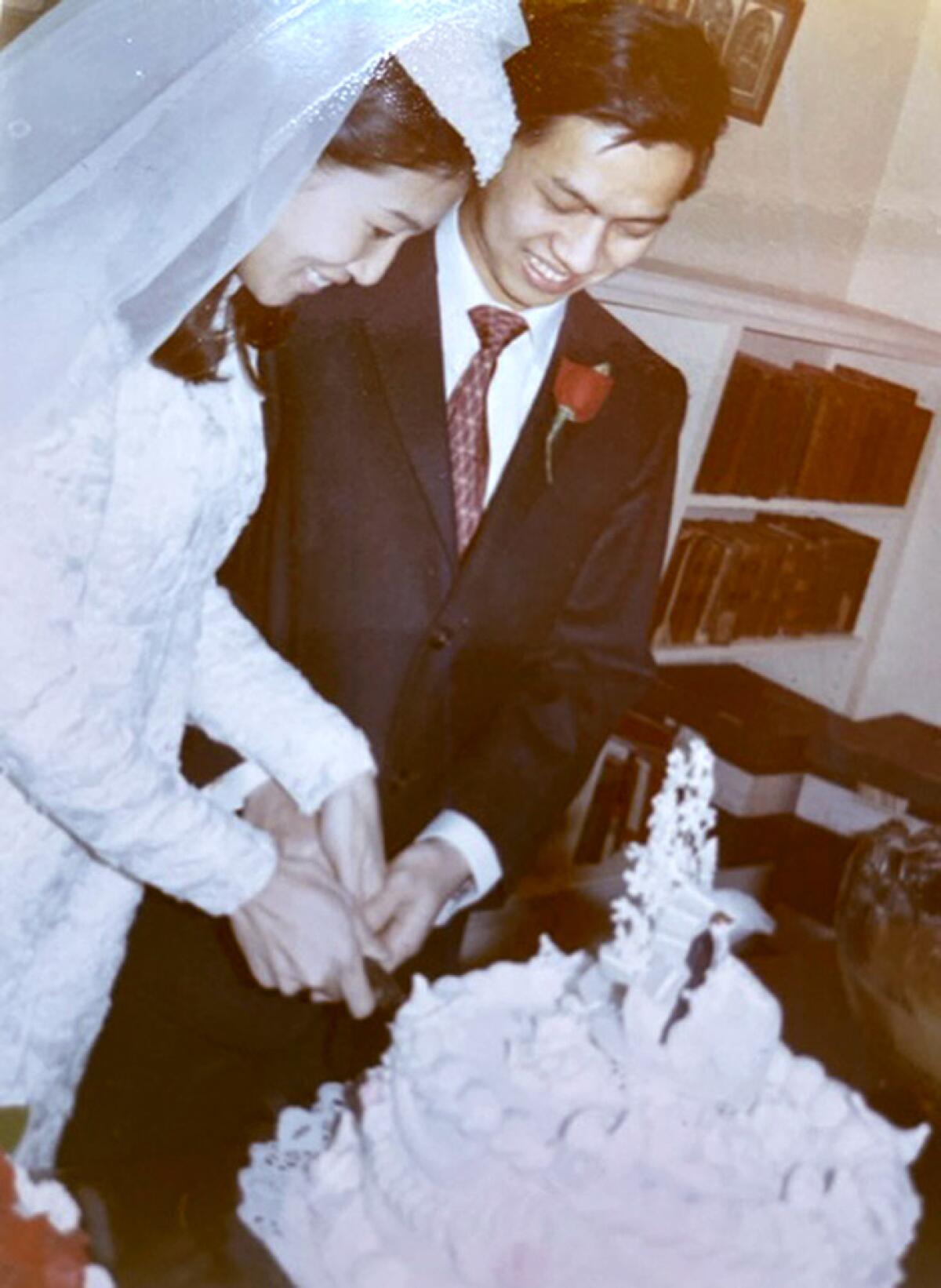
The Taipei of my father’s youth was highly segregated. He went to an all-waisheng elementary school in the capital. But starting in junior high, students were sorted by exam scores. My parents met in college, and their fellow physics majors — some Taiwanese, some waishengren — have stayed close through the years.
Despite marriages and friendships, many in that generation are still defined by their ethnic identities.
In my 20s, I lived in Taipei for several years with my aunt, my father’s older sister. Whenever I mentioned a new friend, her first question was: “Are they waishengren or Taiwanese?”
Sometimes, she said racist things: “Taiwanese people’s houses are always dirty.”
The stereotypes cut both ways. My mom has called waishengren “obnoxious” and complains about their sense of entitlement.
At 76, my dad is among the youngest waishengren to have been born in China. Despite growing up in Taiwan, there is no question in their minds — they are Chinese, not Taiwanese.
But China seems more and more distant to children and grandchildren of waishengren born on the island. People in Taiwan are increasingly likely to consider themselves Taiwanese, not Chinese, and to oppose eventual unification with an authoritarian country that would squelch the freedoms they value.
In Taiwan, the divide between political parties is at least as wide as red and blue in the U.S. Hardcore supporters of the Kuomintang, who tend to be friendlier with mainland China, are “deep blue,” while backers of the independence-leaning Democratic Progressive Party are “deep green.”
Ahead of an election that will shape the island’s relationship with China for the next four years, thousands of Taiwanese in Southern California travel to rally and cast ballots.
For people of my parents’ generation, political affiliation often breaks down across ethnic lines. In my parents’ group chats with their friends, politics is off-limits.
Shortly after the DPP’s Tsai Ing-wen was elected president in 2016, I was taken aback by my dad’s reaction when I told him I was going to visit Taiwan.
“Why do you want to go there?” he said. “It’s not for people like us.”
Four years later, I covered Tsai’s reelection campaign for The Times. At dinner in Taipei with my dad’s side of the family, I brought up the election. My cousin’s son, switching to English, said to me: “Let’s talk about this later.”
One on one, he told me that he didn’t discuss politics with his family. A millennial and third-generation waishengren, he was such a strong DPP supporter that a few days later, he celebrated Tsai’s victory outside her party headquarters. I don’t think he told his parents or grandparents where he went on election night.
The weekend after the Taiwanese church shooting, I saw my parents.
Of course, we were all horrified. But I wondered if, somewhere in the shooter’s warped mind, his politics were similar to my dad’s.
My dad said that he had supported Taiwanese independence in the early days but that many waishengren couldn’t stomach the affinity that Taiwanese felt for Japan.
And what’s up with so many people saying they’re Taiwanese, not Chinese? How can they not acknowledge that they’re Chinese? he groused.
It’s not a contradiction to say that your language and culture originated in China yet consider yourself Taiwanese, I pointed out.
My mom usually keeps quiet during my dad’s political musings. What she has to say would provoke a debate — one in which neither side would budge.
In Southern California, a broad selection of Taiwanese TV is available on cable. My parents have taken to watching the news separately, on different channels — a little like CNN versus Fox News.
“Mom? Do you think you’re Chinese?” I asked.
She responded with silence.
More to Read
Sign up for Essential California
The most important California stories and recommendations in your inbox every morning.
You may occasionally receive promotional content from the Los Angeles Times.
